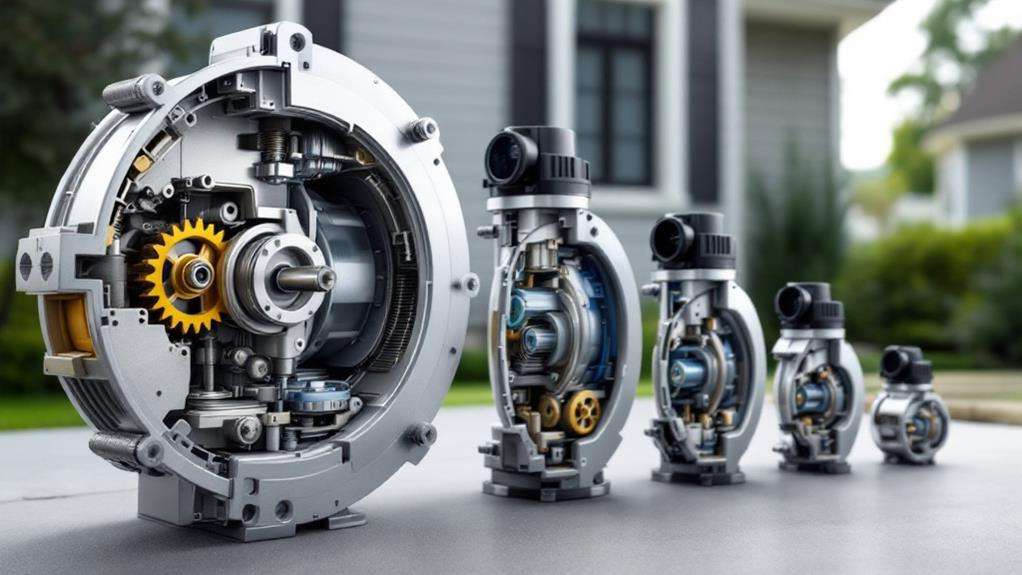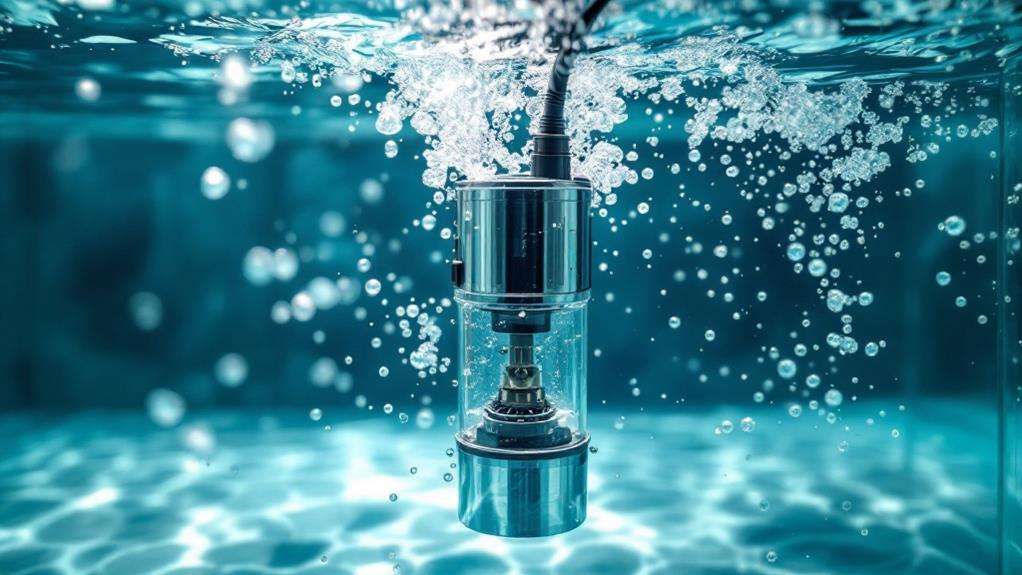Types of Water Pumps for Home Use: A Complete Comparison
When selecting a water pump for your home, you'll encounter several types, each with distinct advantages. Centrifugal pumps are energy-efficient and handle high flow rates, making them ideal for most household needs. Positive displacement pumps offer precise control and can manage viscous fluids. Jet pumps are perfect for shallow wells and compact spaces, while submersible pumps excel in deep wells and flooded areas. Your choice will depend on factors like flow rate, pressure requirements, and the type of fluid you're pumping. Understanding the strengths of each pump type will help you make an informed decision for your specific home needs.
Understanding Water Pump Basics
Nearly every home relies on water pumps for various purposes, from supplying drinking water to operating appliances. To understand the different types of water pumps available for home use, you'll need to grasp some basic concepts.
Water pumps are designed to increase water pressure and move fluids from one place to another. They're typically powered by electricity, gas, diesel, or solar energy. The two main categories of water pumps are centrifugal and positive displacement pumps. Centrifugal pumps use a rotating impeller to pressurize and move water, while positive displacement pumps rely on mechanical contraction and expansion.
Centrifugal pumps fall under the broader category of versatile pumps, which add kinetic energy to the fluid to increase its flow velocity. These are commonly used in domestic settings due to their adaptability. Positive displacement pumps, on the other hand, are better suited for handling fluids with higher viscosity.
When selecting a water pump for your home, consider factors such as the required flow rate, pressure, and the type of fluid you'll be pumping. Understanding these basics will help you choose the most appropriate pump for your specific needs.
Centrifugal Pumps
Centrifugal pumps are the workhorses of home water systems, thanks to their efficiency and versatility. You'll find these pumps commonly used for water supply, irrigation, and various industrial applications. They're designed to handle high flow rates and volumes, making them ideal for most household needs.
One of the key advantages of centrifugal pumps is their energy efficiency. Compared to positive displacement pumps, they consume less power while providing impressive performance. This means you'll save on energy costs in the long run. Additionally, centrifugal pumps require less maintenance, which translates to fewer headaches and lower upkeep expenses for you.
The working principle of centrifugal pumps involves converting kinetic energy into pressure as the fluid's velocity decreases. This process is particularly effective for thin liquids with low viscosity, such as water. Whether you're using them for your home's main water supply, garden irrigation, or a small-scale industrial application, centrifugal pumps offer reliable and consistent performance.
When choosing a pump for your home, consider centrifugal options if you're dealing with standard water applications. Their widespread use in commercial, industrial, and domestic settings is a demonstration of their effectiveness and reliability.
Positive Displacement Pumps

Precision and power define positive displacement pumps, setting them apart from their centrifugal counterparts. These pumps move a fixed volume of water with each cycle, making them ideal for handling viscous liquids and guaranteeing high-pressure output. You'll find three common types of positive displacement pumps:
- Piston pumps
- Diaphragm pumps
- Rotary pumps
Each of these designs offers unique advantages, but they all share the ability to provide accurate and controllable flow rates. This makes them particularly useful in applications requiring precise control, such as in the chemical industry or hydraulic systems.
One of the key benefits of positive displacement pumps is their ability to self-prime, eliminating the need for external priming in many cases. This feature, combined with their effectiveness in handling high-viscosity fluids, makes them a versatile choice for various home and industrial applications.
When you're dealing with thick liquids or need consistent, high-pressure output, positive displacement pumps are often the go-to solution. Their ability to maintain flow rate regardless of pressure changes ensures reliable performance in demanding situations. Consider these pumps when you need precision and power in your water pumping system.
Jet Pumps
While positive displacement pumps excel in handling viscous fluids, jet pumps offer a different approach to water movement. These versatile devices create a high-velocity water jet to augment and move water, making them ideal for shallow wells and water pressure applications in residential settings.
You'll find jet pumps particularly useful for shallow well applications, typically operating at depths of 25-100 feet. They're well-suited for both water supply and pressure enhancing tasks. One of the key advantages of jet pumps is their ability to self-prime, which means you won't need an external priming mechanism. This feature simplifies the installation process and makes maintenance easier.
Jet pumps exhibit a compact design, allowing for easy installation in tight spaces. They're also known for their energy efficiency, consuming less power compared to other pump types. This makes them a cost-effective choice for your home's water pumping needs.
When considering a jet pump for your residential water system, you'll appreciate its versatility in handling both water supply and pressure amplifying tasks. The combination of self-priming capability, compact design, and energy efficiency makes jet pumps an attractive option for many homeowners.
Submersible Pumps

Submersible pumps offer a unique solution for your water pumping needs, combining the pump and motor into a single unit that's fully submerged in water. These well pumps are ideal for residential applications, providing efficient water supply from deep wells, boreholes, and flooded areas. Their compact size and corrosion-resistant construction make them perfect for installation in tight spaces.
One of the key advantages of submersible pumps is their quiet operation, making them suitable for both residential and environmental applications. They're designed to work at various depths, including deep well installations, and benefit from gravity in the pumping process. This versatility guarantees you'll have a reliable solution for pumping water in different scenarios.
Submersible pumps boast an impressive lifespan of up to 25 years, outlasting many other pump types. This longevity is due to:
- The engine staying cool underwater
- Reduced wear and tear
- Efficient operation in submerged conditions
When considering a water pump for your home, don't overlook the benefits of submersible pumps. Their durability, versatility, and quiet operation make them an excellent choice for various residential water supply needs.
Choosing the Right Pump
Selecting the right water pump for your home can make or break your water supply system. When choosing a pump, you'll need to take into account several key factors. First, determine your required flow rate (GPM) and pressure (PSI) based on your home's water usage. Next, evaluate the pump type that best suits your needs, such as centrifugal or positive displacement pumps.
Consider the energy source for your pump, whether it's electric, gas, or solar-powered. The specific application, like well water extraction or irrigation, will also influence your choice. Don't forget to measure the vertical and horizontal distances the water needs to travel, as this affects the total head lift and pump size required.
Pay attention to the pump's construction materials, ensuring they're compatible with your water source and intended use. Review the pump's energy efficiency, maintenance requirements, and noise level to balance performance with long-term costs. Finally, consult a plumber or water system specialist to guarantee proper sizing and configuration for your home's unique needs. By carefully weighing these factors, you'll be able to choose the ideal water pump for your specific situation.
